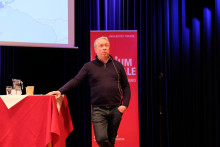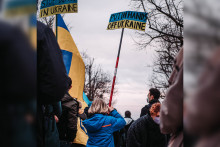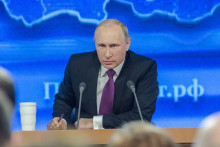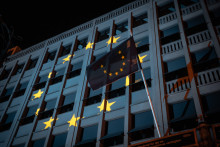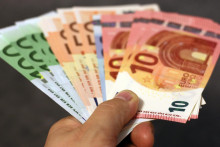Where are we? Just a fortnight ago, Donnelly was shining his light on the war on this site, but in the relatively short period since then, more seems to have happened than ever. Ukraine won back a huge territory in the north of the country from the Russians, Vladimir Putin gave a televised speech for the first time since the start of the war, and mock referendums began today in the Kherson, Donetsk, Luhansk and Zaporizhzhya regions.
Donnelly watched it with amazement, especially the counter-attack in Kherson. 'As surprising as it was wonderful. Ukraine carried out its plans figuratively in the dark and surprised everyone. If Russia wants to regain some ground in that area, it has to do so before winter, so Putin has a month and a half for that. Fighting in winter is very difficult and costly, in all sorts of ways.'
Mobilisation
Despite the many short-term developments, Donnelly says the war is far from over. Ukraine finally has taken the advantage, not much has changed strategically. Putin needs to show hard-line critics that he isn’t losing the war. ‘That is why he has mobilised 300,000 men. By law, he is allowed to increase that number to a million. He is also using the referenda, which everyone knows are fake, to claim the territory as Russian, and threaten nuclear war if Ukriane tries to recapture it, as they just did in the north. Those referendums change the process, but otherwise make little difference.'
This way of organising referendums, according to Donnelly, has been around as long as it has been possible to vote. 'We saw it in the state of Missouri, before the US Civil War when it came to the abolition of slavery. Slavers moved into the territory specifically to make the referendum go their way. You see that now in the occupied regions of Ukraine as well. Many Ukrainian citizens have been deported and murdered and replaced with Russians, so a referendum result would not really express Ukrainian will, even if the referendum were legitimate, which it isn’t.’
Powerplants
What next? According to Donnelly, it would make sense for Putin to have his forces dig in, train and prepare to fight in the spring of 2023 rather than send them straight in now. 'But Putin isn’t always sensible. Nuclear escalation is still possible as an alternative kind of attack, but it does not fit Putin's pattern and modus operandi. Attacking powerplants in Zaporizhzhya does. That would create total chaos. That he kills many of his own people in the process does not matter to him at all. Putin no longer even tries to hide mass graves in Ukraine. We see there that human suffering doesn’t matter to him or to the Russian army at all. '
It is also interesting to see what is happening in Russia. The protests there seem to be growing in size. Good news, Donnelly believes, but whether it makes a difference? 'I don't think so. It would make a difference if there is a strong political competitor who can use that as a leverage. There is one with Aleksey Navalny, but he is stuck and I don't expect he can be freed. There are other political actors within the Russian state, but they are even more extreme than Putin.'
What happens in Europe in the coming period remains important, according to the professor, as do Ukraine's gains. 'They control an important railway line, making it difficult for Russia to supply the Donbas from the north. That is a great success. Putin has to make a choice. Does he try to control both the east and the south, or does he make a choice to pile his resources in one. He will probably want to move south, but that will leave him exposed in the east. Not an easy decision, which is the point.’


